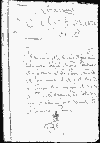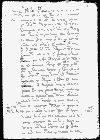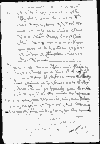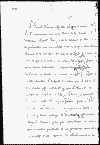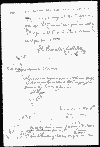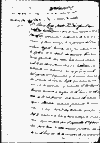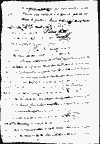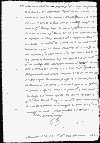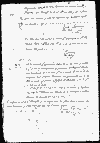
5.675
Navarro, Rafael
Testimony in the case of Rafael Navarro of Mobile, accused of having killed Bruno Romero, of the same standing, in the early morning of June 20, 1796, both being nurses in the hospital of Mobile.
--------
1796 Jun. 30
Olivier, Pedro
Mobile, (Alabama)
Olivier, Captain of the Infantry, being informed by the surgeon of the Royal Hospital, Juan Gallegos, about 4:30 in the morning that Bruno Romero was greviously wounded, went to the hospital with two witnesses, Ramon de Pasos and Jose Bermudes, sergeant and corporal of the regiment in order to get his declarations. Romero swore that he was employed as a nurse in the hospital, that early in the morning the cook of the hospital, Rafael Navarro wounded him with a knife from the kitchen as he was sleeping in the lobby. When asked the motive, he replied that all day yesterday they had had words as Navarro was drunk, as the sick man, Fran(cis)co Lattre and the soldier Jose Morales could testify; that Navarro asked Romero for the key to the kitchen and soon after he felt the wound. Romero did not know where the knife was as Navarro ran out into the street. Romero is 29 years old and does not know how to write so signs with a cross. The witness, Ramon de Pasos and Jose Maria Bermudes also sign and Olivier signs as receiving the testimony.
D.S. Copy (Spanish)
--------
1796 Jun. 30
Olivier, Pedro
Mobile, (Alabama)
Gallegos appeared before Olivier and the two witnesses and swore that about 4:15 that morning he treated Romero who sustained two wounds, one penetrating to his lungs, the second one not so serious, both made with a sharp instrument. Gallegos is 38 years old. He signs together with the witnesses de Pasos and Bermudes, in the presence of Olivier.
D.S. Copy (Spanish)
--------
1796 Jun. 30
Olivier, Pedro
Mobile, (Alabama)
Olivier, on news that Romero had died, went with the two witnesses to the hospital. There appeared before them Corporal Jose Gomez and Joaquin Llanos, and Gallegos. Having seen the body in the morgue, Gallegos testifies that it was Romero, who died about 6 o'clock of the two wounds that he had treated in his visit at 4:15 that morning. Gomez and Llanos testified that it was Romero. Gallegos signs; Gomez and Llanos with a cross; de Pasos and Bermudes sign as witnesses; Olivier signs as taking the testimony.
D.S. Copy (Spanish)
--------
1796 Jul. 1
Olivier, Pedro
Mobile (Alabama)
Fran(cis)co Lattre, of the Regiment, appeared before Olivier and the two witnesses and swore that being sick in the hospital, he herd Romero shout and saw from the window, Navarro rushing out and running; that he had not seen the instrument with which he had wounded Romero; that he did not know that Navarro was accustomed to carry arms; that while he was in the hospital there had rarely been a day when the two had not had words and that they had had a dispute the night before; that he had not heard Navarro ask for the key because he had been asleep; that there used to be a long knife in the kitchen. Lattre is 45 years old. He signs with a cross; de Pasos and Bermudes sign as witnesses and Olivier signs.
D.S. Copy (Spanish)
--------
1796 Jul. 1
Olivier, Pedro
Mobile, (Alabama)
Morales appeared before Olivier and the two witnesses and swore that the assaulter was Navarro, having checked a little earlier that he was in the lobby where Romero was sleeping; that the wound was made with the knife from the kitchen; that he had heard Romero say that Navarro had asked him for the key to the kitchen and that he had given it to him; that he had herd Romero shout and saw Navarro run out of the hospital to the house of the gunsmith, Mr. Antonio and then to the church where Morales saw him at the door a quarter of an hour later when he was sent to call the pastor to hear the confession of the wounded man; that he had head Romero say nothing about the motive; that they had had an argument about 8 o'clock of the same night which Lattre quieted and he heard nothing between them until dawn; that he knew that they had a big knife in the kitchen; that he had not seen Navarro with a knife in the 6 years he had known him; that there were no other sick in the hospital at the time except himself and Lattre; that he was 30 years old. Morales signs with a cross; Pasos and Bermudes sign as witnesses before Olivier.
D.S. Copy (Spanish)
--------
1796 Jul. 1
Olivier, Pedro
Mobile, (Alabama)
Matias Hernandez, 2nd Lieutenant of the Regiment of Louisiana, appeared before Olivier and the two witnesses and swore that he knew only what Navarro had told him about the case; that being ordered to get Navarro, he went to the church and found him; when asked why he had taken sanctuary there, Navarro said it was because he had knifed Romero; that they had had an argument; that Romero had hit him on the head with a stick and so he had knifed him at dawn; that it was almost certain that none of the soldiers could have heard what Navarro told him; that Navarro had no knife when taken; that he said he had thrown it into the corner of Mr. Antonio's orchard. Hernandez is 45 years old. He signs with the two witnesses, de Pasos and Bermudes before Olivier.
D.S. Copy (Spanish)
--------
1796 Jul. 2
Olivier, Pedro
Mobile, (Alabama)
Olivier and the two witnesses went to the dungeons of Fort Carlota where Navarro was and Navarro swore that he was 40 years old, a native of Cordova in Andulusia; that he was stationed in Mobile; the he was arrested because he had killed Romero on thursday, the 30th of last month; that he killed Romero because Romero had hit him on the head with a stone; that he killed him as he was sleeping in the lobby near the door of the hospital; that it could be possible that Morales saw him; that he found the knife in the kitchen; that he had not had the intention of killing but while he was in the kitchen he heard Romero and Morales talking about what had happened in the evening and he immediately carried out his plan, then ran out the door to the church; that he had hidden the knife under a board beside the door of the church; that he killed Romero because he was always bothering him and insulting him; that he remained in the church until Hernandez came to get him. Navarro signs with a cross and de Pasos and Bermudes sign as witnesses, before Olivier.
D.S. Copy (Spanish)
--------
1796 Jul. 2
Olivier, Pedro
Mobile, (Alabama)
As a result of Navarro's confession, Olivier the two witnesses named in the case, and Jose Puchegy, an orderly, found the knife. The knife had a handle of black wood with the letter A carved on it. Puchegy signs with a cross; Pasos and Bermudes sign.
D.S. Copy (Spanish)
--------
1796 Jul. 2
Olivier, Pedro
Mobile (Alabama)
Olivier, accompanied by the two witnesses, went to the prison of Fort Carlota and upon being shown the knife, Navarro signs with a cross; Pasos and Bermudes sign as witnesses before Olivier.
D.S. Copy (Spanish)
--------
1796 Jul. 30
Carondelet, (Francisco Hector Luis), Baron de
New Orleans, (Louisiana)
(All the proceedings) together with the official letter of the Commandant of Mobile, No. 162, are to be sent to the judge.
D.S. Copy (Spanish)
--------
1796 Jul. 16
Olivier, Pedro
Mobile, (Alabama)
to Baron (Francisco Hector Luis) de Carondelet
(New Orleans, Louisiana)
(Letter No. 162) Olivier notifies Carondelet that in the early morning of June 30, Rafael Navarro killed Bruno Romero in the Royal Hospital of Mobile. He sends herewith the case so that Carondelet may judge if Navarro is entitled to immunity and also sends to him Navarro and the two principal witnesses, in charge of a sergeant, Enrique Angel, and six soldiers.
L.S. Copy (Spanish)
--------
1796 Aug. 11
Vidal, Nicolas Maria
New Orleans, Louisiana
to (Baron Francisco Hector Luis de Carondelet
New Orleans, Louisiana)
Vidal has looked over the proceedings sent him concerning Navarro's case and since it seems that the murder was premeditated, the law of immunity could not be applied according to the Papal bulls and the Royal decree of February 28, 1794 which say that immunity applies only to those who kill accidentally or in self- defense. An official letter together with a copy of the proceedings might be sent to the Bishop to get his approval to judge Navarro by the civil and royal law.
D.S. Copy (Spanish)
--------
(1796 Aug. 11)
Carondelet, (Francisco Hector Luis) Baron de
(New Orleans, Louisiana)
It is to be done as judged by the Military judge, (Vidal). This decree is certified by Carlos Ximenez.
D.S. Copy (Spanish)
--------
1796 Sep. 16
Ximenez, Carlos
New Orleans, (Louisiana)
The above conforms to the originals of the proceedings sent by Olivier and the copy has been made in 15 pages to be used instead of the originals.
D.S. (Spanish)
--------
1796 Sep. 19
Carondelet, (Francisco Hector Luis) Baron de
New Orleans, (Louisiana)
to Bishop (Luis Penalver y Cardenas
New Orleans, Louisiana)
Penalver will recognize from the attached papers, that since Navarro is guilty of a treacherous and premeditated crime, which he admitted, it is impossible to apply the law of immunity. He asks Penalver to allow the case to be judged by civil and royal authorities.
D.S. (Spanish)
--------
1796 Sep. 20
(Penalver y Cardenas, Luis) Bishop of
New Orleans, (Louisiana)
All the documents in the case are to be collected and sent to Father Patrick Walsh as ecclesiastical attorney-general so that he may make a decision. This decree is certified by Father Isidro Quintero who adds in a note that he notified Walsh of the above decree.
A.D.S. (Spanish)
--------
1796 Sep. 24
Walsh, Father Patrick
New Orleans, (Louisiana)
to Bishop (Luis Penalver y Cardenas
New Orleans, Louisiana)
Having examined the proceedings Walsh concludes that since Navarro confessed the crime, the law of immunity cannot be applied and so Navarro is to be judged by civil law. However, if it is proved that Navarro is innocent, he must be returned to the church.
A.L.S. (Spanish)
--------
(1796) (Sep. 24)
(Penalver y Cardenas, Luis) Bishop of
(New Orleans, Louisiana)
It is decreed (as above). Penalver signs this with his flourish; Quintero certifies it and adds in a note that Walsh was notified of the decree.
A.D.S. (Spanish)
--------
(1796) (Sep. 28)
(Penalver y Cardenas, Luis), Bishop of
(New Orleans,) Louisiana
Having examined Carondelet's petition and all the proceedings, following Walsh's decision Penalver will place Navarro under the civil law. If Navarro proves to be innocent he must be turned over to the Church. Quintero certifies the above and adds in another note that Walsh was notified of the decree.
A.D.S. (Spanish)
--------
1796 Sep. 28
(Penalver y Cardenas), Luis, Bishop of
New Orleans, Louisiana
to Baron (Francisco Hector Luis) de Carondelet
(New Orleans, Louisiana)
In reply to Carondelet's letter of the 19th Penalver sends the decree. Quintero adds in a note that this is a copy of the letter sent.
D.S. Copy (Spanish)
IV-5-l D.S., L.D., A.D.S, A.L.A. and Copies 37pp. 4to. (Spanish)
16
